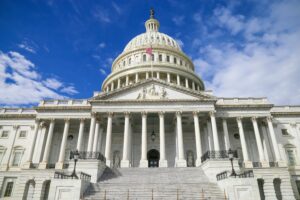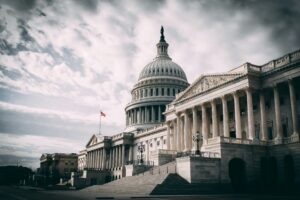Capitol Compass: July 2024 Edition
- The House completed committee markups on all of their appropriations bills but managed to pass only five: Defense, Homeland Security, Interior-Environment, Military Construction-Veterans Affairs, State-Foreign Operations. Notably, the House failed to bring the Agriculture-FDA bill to the floor. However, the House postponed voting for the rest of July and moved to leave a week early for its August recess. The House is out of session until September 9.
- Current issues with the Agriculture-FDA bill are the funding levels and conservative policy riders, including provisions to block abortion contraceptive protections. Republicans have already dropped language blocking access to abortion pills due to opposition from swing-state Republicans.
- In the Senate, bill markups will continue in the first few days of August, but the chamber is unlikely to bring the bills to a floor vote. Like the House, they will go into the August recess with unfinished business and return to session on September 9. The August recess is expected to be quiet as usual, especially as the campaign season ramps up and diverts Congress’s attention.
- As a result, Congress will likely need to pass a continuing resolution (CR) in order to give themselves more time to authorize FY 2025 spending. Authorizations for FY 2024 spending expire on Sept. 30. The length of a potential CR is unclear, but it may last until the end of the year.
- The Farm Bill remains stalled ahead of its Sept. 30 deadline. Congress will need an extension to give them more time to negotiate.
- The House GOP has released their version of the bill, which includes cuts to the Supplemental Nutrition Assistance Program and tighter restrictions aimed at curbing fraud. Senate Democrats have not released their version of the bill but continue to push for climate initiatives in conservation.
- The post-election lame duck session may witness a flurry of legislative activity focused on key legislation, all dependent on the outcomes of the November elections.
Presidential Election Enters New Phase
- President Joe Biden dropped out of the presidential election, and Vice President Kamala Harris has emerged as the Democratic nominee. Prior to dropping out, Biden was facing a bleak electoral map and negative polls in nearly every swing state. Since Harris has taken over the ticket, the electoral prospects for Democrats, including down-ballot candidates, have improved in swing states like Georgia, Arizona, and Nevada, as well as Michigan, Wisconsin, and Pennsylvania.
- However, further polling will have to be conducted to get a better understanding of public opinion, especially as the Harris campaign gets off the ground. Harris has reinvigorated Democratic campaigning, as evidenced by the $200 million in campaign donations and 170,000 volunteers.
- Nevertheless, polling currently gives a slight lead to former President Donald Trump nationally, as well as in most of the key states. Harris has not selected her running mate yet but is expected to announce it within the coming weeks. Her running mate may give her an additional bump, especially if they hold office in a battleground state like Arizona or Michigan.
- Trump has emerged from the Republican National Convention as the Republican presidential candidate. His newly selected running mate Sen. JD Vance (R-OH) has received a lukewarm response from voters, but the party is unlikely to change the ticket.
- While it is still early, the balance of power in Congress is at play. Traditionally, high voter turnout for a presidential candidate with high approval from voters is associated with a helpful down-ballot effect. The positive reception to Harris may indicate a favorable outcome for Democrats down ballot, but voters will have over three months to observe
Overturning Chevron Creates Uncertainty
- On June 28, the United States Supreme Court overturned the longstanding “Chevron doctrine,” creating uncertainty in future regulatory rulemaking. The Chevron doctrine refers to a 40-year-old standard that required courts to defer to regulatory agencies’ interpretations of ambiguous laws when promulgating regulations.
- While the fallout of the decision is unclear, some experts predict this ruling will dramatically alter how federal agencies operate, potentially resulting in legal challenges to regulations currently on the books, a slower rulemaking process, and a diminished federal ability to develop new programs or innovations. Depending on the posture of the policy issue, the change on regulatory policy may benefit or hurt stakeholders.
- Under Chevron, a stakeholder would need to convince a court that the agency’s interpretation of an ambiguous statute is unreasonable. Post-Chevron, a stakeholder only needs to convince a court that the stakeholder’s reading of the statute is better than the agency’s reading.
- Federal agencies may face a wave of legal battles over the next few months as private interests attempt to overturn decisions that relied on agency deference. Moving forward, agencies could lose cases against legal challenges as the courts are likely to be more receptive to challenges.


